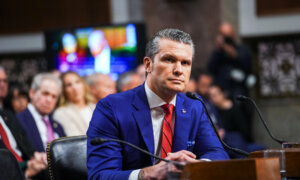Sen. Gary Peters (D-Mich.) said he didn’t “know of any corporate board of directors that would hire a CEO” who hadn’t managed more than 100 employees.
Other Democrat senators suggested that being drunk on the job—an allegation Hegseth has denied—and marital infidelity should be disqualifying acts for a defense secretary.
Sen. Markwayne Mullin (R-Okla.), however, criticized his Democrat colleagues for holding Hegseth to higher standards than they do themselves.
“You know, there’s a lot of … talking about qualifications, and then about us hiring him if we are the board. But there’s a lot of senators here I wouldn’t have on my board,” Mullin said, pointing out that there are few qualifications for the job of U.S. senator.
“You guys aren’t any more qualified to be the senator than I’m qualified to be the senator, except we’re lucky enough to be here.”
Mullin noted that there are likewise few prerequisites for the role of defense secretary, other than that the person must be at least seven years removed from active-duty military service.
He also pointed out that drunkenness and infidelity are not uncommon among members of the Senate.
“How many senators have showed up drunk to vote at night? Have any of you guys asked them to step down and resign from their job? And don’t tell me you haven’t seen it, because I know you have,” Mullin said.
“And then how many senators do you know have got a divorce for cheating on their wives? Did you ask them to step down? No, because it’s for show.”
Hegseth, at Mullin’s prompting, went on to address Peters’s concerns by noting that he was already building “one of the best possible teams you can imagine” to help him lead the Pentagon.
“The only reason I’ve had success in life, to include my wonderful wife, is because of people more capable around me and having that self-confidence to empower them and say: ‘Hey, run with the ball. Run with the football. Take it down the field. We’ll do this together. I don't care who gets the credit.’ And in this case, that’s how the Pentagon will be run.”
Additionally, he said, members would be reinstated with their rank and receive an apology.
“It’s called the Jerusalem cross; it’s a historic Christian symbol,” Hegseth said, noting that the same cross was printed on the program of the late President Jimmy Carter’s memorial service last week.
Hegseth explained that he had received orders to guard Biden’s inauguration, but those orders—along with others—were inexplicably revoked “at the last minute.” It wasn’t until he began writing his book, “The War on Warriors,” that he learned he had been identified as an extremist.
“Things like focusing on extremism, senator, have created a climate inside our ranks that feels political when it hasn't ever been political,” Hegseth said, adding that he would shift that focus if confirmed.
"In President Trump's defense department, they will be apologized to; they will be reinstituted with pay and rank," he said.
The mandate ended in 2023. However, Defense Secretary Lloyd Austin has said that members who declined to get vaccinated will not be reinstated.

Hegseth answered in the negative to the former. Answering the latter, Hegseth said there was an allegation in 2017, but he was cleared of it.
Hegseth responded by promising to prioritize such audits and affirming his stance that doing so is “an issue of national security.”
American taxpayers, he said, “expect that we know where that money goes, and if that money is going somewhere that doesn’t add to tooth and instead goes to fat or tail, we need to know that; or if it’s wasted, we need to know that.”
Hegseth added that he felt prior secretaries of defense have failed to stress “the strategic prerogative of an audit.”
At Veterans for Freedom, in 2008, Hegseth raised $8.7 million but spent $9 million, resulting in a deficit, according to Blumenthal, citing tax records.
Hegseth said he is “proud” of his work at Veterans for Freedom, whose chief operating officer, in Hegseth’s words, “will attest that every dollar we raised was used intentionally toward the execution of our mission, which is supporting the warfighters.”
Blumenthal, citing tax records, said that at Concerned Veterans for America, the other organization Hegseth led, he ran a deficit, adding that the Department of Defense cannot tolerate fiscal mismanagement.
During questioning by Sen. Joni Ernst (R-Iowa), Hegseth said that Concerned Veterans for America stuck to its budget.
Hegseth said an audit “is a matter of national security.”
The Pentagon has never passed an audit.
“The statements you said about people who have views differently than you, that we’re the enemy. Are you saying that 50 percent of the DOD—if they hold liberal views or leftist views or are Democrats—are not welcome in the military?” Gillibrand asked.
Hegseth responded by pointing to his record.
“Senator, I volunteered to deploy to Afghanistan under Democrat President Barack Obama,” he noted. “I also volunteered to guard the inauguration of Joe Biden but was denied the opportunity to serve because I was identified as an extremist by my own unit for a Christian tattoo.”
Hegseth has previously said he was flagged by another service member for a cross tattoo on his chest.
In November, a member of the District of Columbia National Guard came forward with an email he sent to the unit’s leadership voicing concerns over another of Hegseth’s tattoos—the phrase “Deus Vult” tattooed on his bicep, which the service member claimed was associated with white supremacist groups. The Latin phrase translates to “God wills it.”
Hegseth responded to the accusations of white supremacy on social media, contending that they were fueled by “anti-Christian bigotry.”
Shaheen noted a comment Hegseth made in a Nov. 7 podcast interview, in which he stated: “I'm straight up saying that we should not have women in combat roles. It hasn't made us more effective.”
She noted more recent comments Hegseth has made indicating support for women in the military, including in combat roles.
“What I'm confused about, Mr. Hegseth, is, which is it? Why should women in our military, if you were the secretary of defense, believe that they would have a fair shot and an equal opportunity to rise through the ranks?”
Hegseth said he’d be honored to work with women in the military, before Shaheen interrupted to say: “Well, I appreciate your eleventh-hour conversion” and submitted into the congressional record a copy of a chapter from one of Hegseth’s most recent book titled “The Deadly Obsession With Women Warriors.”
Shaheen next pressed Hegseth to state whether he would continue the Women, Peace, and Security initiative at the Department of Defense, if he’s confirmed. The initiative looks to expand the participation of women in foreign policy and national security decision-making.
“I will commit to reviewing that program and ensuring it aligns with America's first national security priorities, meritocracy, lethality, and readiness,” Hegseth replied.
Cotton used part of his time to reframe the debate about women in combat, asserting women have seen combat through support roles over the years but have only changed in the past decade to allow women in specific combat specialties like infantry, artillery, and special operations.
Cotton then asked if President-elect Donald Trump has indicated any plans to close these roles off to women.
“He has not indicated to me that he has plans to change whether or not women would have access to these roles,” Hegseth said. “However, I would point out [that] ensuring that standards are equal and high is of importance to him and great importance to me.”
Hegseth said any decision to change a standard to improve a diversity metric detracts from readiness, meritocracy, and lethality.
“That's the kind of review I'm talking about, not whether women have access to ground combat,” he said.
However, the committee’s chairman, Sen. Roger Wicker (R-Miss.), said one round is adequate, which was agreed to in December.
These allegations include sexual misconduct, alcohol abuse, and financial mismanagement, which he has denied.
“A small handful of anonymous sources were allowed to drive a smear campaign, an agenda about me, because our left-wing media in America today, sadly, doesn't care about the truth,” he said.
Hegseth acknowledged that he has faults but emphasized that he is a changed man, thanks to his Christian faith and his wife, Jennifer, who was seated behind him in the chamber.
“I'm not a perfect person, as has been acknowledged. Saved by the grace of God—by Jesus and Jenny,” Hegseth said.
“We will remain patriotically apolitical and stridently constitutional,” he said.
“Unlike the current administration, politics should play no part in military matters. We are not Republicans or Democrats—we are American warriors. Our standards will be high, and they will be equal, not equitable. That is a very different word.”
Hegseth’s reference to high and equal standards came after questions about his views of women serving in combat roles.
In a December 2024 interview on “The Megyn Kelly Show,” Hegseth said his focus isn’t necessarily on barring women from combat roles but ensuring standards aren’t lowered simply to make those roles more accessible to women.
“We need to make sure every warrior is fully qualified on their assigned weapon system, every pilot is fully qualified and current on the aircraft they are flying, and every general or flag officer is selected for leadership based purely on performance, readiness, and merit,” he added.
“He will bring the perspective of being the first secretary of defense to have served as a junior officer on the frontlines—not in the headquarters, on the front lines—in the war on terror, and recognizes the human costs, the financial costs, and the policy drift that was discussed often in this very room that led us to decades and decades of war,” Waltz testified before the Senate Armed Services Committee.
Waltz, a retired Green Beret, described Hegseth as “a dear friend for over a decade” who has the communication skills necessary to convey the Pentagon’s goals to the American people.
“I can’t imagine having a more capable partner in my position as national security adviser. Pete is a man of family, of faith, and he’s committed to making our country strong again,” Waltz said.
Hegseth “is fearless, unflappable, and confronts conflicts head on,” Bellavia wrote. “ He's a leader to the core.
“When Pete is confirmed as the next secretary of defense of the United States of America, this country will finally know the privilege of having a true ambassador able to speak on behalf of this generation and its two-decade global war on terror.”
Wicker described Bellavia’s statement as one of many from U.S. service members expressing support for Hegseth’s confirmation.
Bellavia worked with Hegseth at the nonprofit veteran advocacy group Vets For Freedom, which Bellavia co-founded.
“As I've said to many of you in our private meetings, when President Trump chose me for this position, the primary charge he gave me was — to bring the warrior culture back to the Department of Defense,” Hegseth wrote.
“He, like me, wants a Pentagon laser-focused on warfighting, lethality, meritocracy, standards, and readiness. That's it. That is my job.”
Beyond strengthening a warrior ethos, Hegseth said his objectives will be to revive the defense industry and improve the weapons acquisition process, support the U.S. military’s ongoing modernization efforts, and expand its ability to deter conflicts with near-peer nation-state actors, namely communist China.
“We can no longer count on ‘reputational deterrence’—we need real deterrence,” Hegseth wrote.
Hegseth said another objective will be to responsibly end the conflicts the United States is currently involved in so that the military can focus its attention and resources on larger threats.
Trump’s Pentagon nominee has elicited pushback over statements he’s made in opposition to women serving in combat roles, as well as an allegation he sexually assaulted a woman during an extramarital affair in 2017 and claims he drinks alcohol in excess.
Hegseth, who has denied the sexual assault allegation and the claims of alcoholism, did not mention the controversies in his prepared statement.
“Pete Hegseth will make a GREAT Secretary of Defense. He has my Complete and Total support. Good luck today, Pete!” he wrote on Truth Social.
Hegseth is the first of Trump’s nominees to go before the Senate.
Hegseth will aim to assure the committee that he is qualified to lead the Department of Defense.
The hearing will begin at 9:30 a.m. ET and will be streamed online.
Here’s what to know about Hegseth and the proceedings:
- The hearing will begin at 9:30 a.m. ET and will be streamed online.
- Hegseth has signaled that he would place a renewed focus on warfighting.
- His opening statement will highlight his experience on the frontlines in Iraq and Afghanistan.
- Hegseth is expected to field questions about his previous comments questioning the role of women in combat. He has said he would ensure standards aren’t lowered simply to make roles easier for women to enter.
- He is also likely to be asked about allegations of sexual misconduct, excessive drinking, and financial mismanagement. He has denied all accusations of wrongdoing.
- The retired major served in the Army National Guard before joining Fox News as a contributor in 2014.
- He also previously led two veteran advocacy nonprofits and is a Princeton University graduate.
- Trump previously considered Hegseth for the role of Veterans Affairs secretary during his first administration but ultimately went in another direction.

The U.S. Senate is set to begin hearings on Jan. 14 to consider the first of President-elect Donald Trump’s Cabinet nominees.
Much of the attention during the hearings is likely to focus on Pete Hegseth, a former Minnesota Army National Guard officer, whom Trump has nominated for the role of secretary of defense.
The Senate Armed Services Committee, leading off Hegseth’s confirmation process, could question him about his plans to reorient the military’s warfighting focus and his views on women serving in combat roles.
Separately, the Senate Veterans Affairs Committee had scheduled a Tuesday hearing to consider Trump’s nomination of former Rep. Doug Collins (R-Ga.) to lead the Department of Veterans Affairs. It has since postponed the hearing to Jan. 21.
The first hearing could set the tone for a slew of additional confirmation hearings this week, ahead of Trump’s Jan. 20 inauguration.
Republicans hold a 53–47 majority in the Senate, leaving Trump’s nominees with little room to succeed if several Republicans break ranks.
Warfighting Focus
Hegseth has signaled that if he is confirmed as defense secretary, he will place a renewed focus on warfighting. In an interview with Fox News host Sean Hannity in December 2024, Hegseth said Trump told him to “get in there and clean out all the social justice and politically correct garbage” and “get back to lethality, warfighting, accountability, meritocracy, and readiness.”
Addressing the topic of women in combat in an early December 2024 interview on “The Megyn Kelly Show,” Hegseth said his primary focus is not on barring women from combat roles but on ensuring that standards aren’t lowered simply to make those roles easier for women to enter.
“If we have the right standard and women meet that standard, roger, let’s go,” he said. “If they can’t—and that’s a product of physical differences because the standard’s high—then that’s just the reality.”
In a Nov. 7, 2024, interview with podcast host and former Navy SEAL Shawn Ryan, Hegseth said the placement of women in combat roles so far hasn’t made the military more effective, hasn’t made the military more lethal, and has made fighting more complicated.
Seven Senate Democrats authored a Dec. 17, 2024, letter declaring that Hegseth’s comments about women in combat, as well as allegations that he sexually assaulted a woman in 2017, are disqualifying for his nomination.
Countering U.S. Adversaries
Hegseth’s confirmation hearing will also likely focus on his plans to lead the U.S. military amid rising competition with conventional military powers such as China, Russia, Iran, and North Korea.
In 2020, the Chinese regime overtook the United States as the nation with the largest naval fleet by sheer number of ships. China has continued to expand this lead while the U.S. fleet size has stagnated.
Russia’s ongoing war in Ukraine has also tested the U.S. military-industrial base. In his November 2024 interview with Ryan, Hegseth said he had spoken to U.S. artillery troops who have seen their training time cut because so much of the U.S. supply of artillery shells is being diverted to Ukrainian forces.

Ukrainian soldiers fire a M777 howitzer at Russian positions near Bakhmut, Ukraine, on March 17, 2023. (Aris Messinis/AFP via Getty Images)
North Korea and Iran have reportedly supplied Russian forces with missiles, artillery shells, and one-way attack drones.
Western officials have said that they believe that Pyongyang has sent thousands of its troops to help Moscow in the ongoing fighting in its western Kursk region. Last week, outgoing U.S. Secretary of State Antony Blinken warned that Russia may soon transfer advanced space and satellite technology to North Korea in exchange for Pyongyang’s troops.
Israel has struck Iran and degraded Iranian-backed forces throughout the Middle East over the past year. Still, some threats, such as Houthi terrorists in Yemen, continue to pose challenges for Israel.
Hegseth’s Personal Record
Beyond policy, Hegseth could face scrutiny over his personal life.
Some of that controversy has centered around allegations that Hegseth drinks alcohol in excess.
In his interview with journalist and podcaster Megyn Kelly, Hegseth said he has no drinking problem and pledged not to drink at all while serving as defense secretary.
“In a combat zone, you’re not allowed to drink,” said Hegseth, who saw combat deployments to Iraq and Afghanistan as an infantry officer.
“That’s how I view this role, as secretary of defense, is that I’m not going to have a drink at all, and it’s not hard for me because it’s not a problem for me.
“But I need to make sure the senators and the troops and President Trump and everybody else knows, when you call me 24/7, you’re getting fully dialed in Pete, just like you always did in Iraq and Afghanistan.”
He is also facing scrutiny regarding allegations that he sexually assaulted a woman in 2017. He reached a settlement agreement with the unnamed accuser, but the allegations resurfaced after Trump nominated him for the Pentagon role.

Pete Hegseth, President-elect Donald Trump's nominee to be secretary of defense, and his wife, Jennifer Rauchet, walk through the Hart Senate Office building in Washington on Dec. 11, 2024. (Anna Moneymaker/Getty Images)
Hegseth has said that it was wrong for him to become sexually involved with his accuser while married but has maintained that the 2017 encounter with the other woman was consensual. His attorneys have said that his accuser may face a defamation lawsuit if she publicizes any false claims about the incident.
“I’ve been honest about that encounter, starting with law enforcement, from the beginning,” Hegseth told Kelly last month. “I may have been drinking, but I was cognizant enough to remember every single detail.”
Among those still undecided on Hegseth’s nomination are Sens. Joni Ernst (R-Iowa) and Susan Collins (R-Maine). Hegseth has met with both lawmakers in recent weeks, and they have said that they had substantive discussions.
In a Dec. 15, 2024, interview with WMTW in Maine, Collins said her conversation with Hegseth covered both his views on women in combat and the sexual assault allegation he faces.
“I have been insistent on an FBI background check that, in his case, can investigate and probe the allegations that have been made against him,” Collins said.

Sen. Susan Collins (R-Maine) speaks with reporters after meeting with Pete Hegseth, President-elect Donald Trump's choice to be defense secretary, on Capitol Hill on Dec. 11, 2024. (Mark Schiefelbein/AP Photo)
So far, Trump has stood by Hegseth for the Pentagon position.
“Pete Hegseth is doing very well. His support is strong and deep, much more so than the Fake News would have you believe,” Trump said in a Dec. 6, 2024, post on his social media platform, Truth Social.
Trump went on to describe Hegseth as a winner and wrote, “There is nothing that can be done to change that!!!”
Outside his military career, Hegseth has been a mainstay on Fox News, providing political commentary across the network.
He has also written multiple books, the most recent of which is “The War on Warriors: Behind the Betrayal of the Men Who Keep Us Free.” The book raises concerns that U.S. military leadership has been prioritizing political issues over maintaining warfighting capabilities.

The Pentagon is seen from the air in Washington on March 3, 2022. (Joshua Roberts/Reuters)
The American Accountability Foundation (AAF), a self-described conservative nonprofit government watchdog, has already begun compiling a list of high-ranking military officers they believe have been too focused on promoting political ideology and whom Hegseth should drive out of the military if he becomes defense secretary.
Hegseth could be questioned about whether he will act on the AAF list and his broader plans for reforming the military.

The confirmation hearings for Veterans Affairs Secretary nominee Doug Collins and Interior Secretary nominee Doug Burgum, initially scheduled for Jan. 14, have been postponed amid delays in the vetting process.
Sen. Jerry Moran (R-Kan.), chairman of the Senate Committee on Veterans’ Affairs, said he has postponed the confirmation hearing for Collins to Jan. 21—the day after President-elect Donald Trump’s inauguration.
In a Jan. 13 statement, Moran said that Collins had submitted all the necessary paperwork “in a timely manner” but the FBI has not yet completed its customary background check of the nominee.
“In accordance with long-standing practice, the committee should have an opportunity to review Congressman Collins’ FBI file before the confirmation hearing,” Moran said.
“I expect the FBI to complete its review quickly so that the committee can move forward with its role of evaluating the President’s nominee,” he added.
Collins was a member of the House of Representatives serving Georgia’s ninth district between 2013 and 2021. He sat on the House Judiciary Committee and served as vice chair of the House Republican Committee.
A U.S. Air Force Reserve chaplain, the Gainesville, Georgia, native also served in Georgia’s House of Representatives. He has a wife, Lisa, and three children: sons Copelan and Cameron and daughter Jordan.
Meanwhile, Sen. Mike Lee (R-Utah), chairman of the Energy and Natural Resources Committee, said the Senate committee has delayed Burgum’s hearing from Jan. 14 to Jan. 16.
Lee stated that Burgum had been “fully cooperative” throughout the vetting process and promptly submitted his paperwork to the Office of Government Ethics (OGE). He said the delay was caused by the OGE.
“Despite his compliance and the Energy and Natural Resources Committee noticing the hearing in accordance with all rules, OGE has yet to complete its review. This bureaucratic delay is unacceptable,” he said.
In a statement announcing the delay, Lee called on the OGE to “act with urgency and complete its review without further unnecessary delays.”
The delay came after Sen. Martin Heinrich (D-N.M.), the committee’s ranking member, and his fellow Democrats sent a letter to Lee urging him to postpone the hearing for at least a week because the committee had yet to receive Burgum’s financial disclosure report and ethics agreement.
“In view of the fact that the Committee still does not have these documents, which are essential for us to faithfully discharge our constitutional advice-and-consent responsibilities, we respectfully request that you postpone the scheduled hearing on Governor Burgum’s nomination for at least a week to give Members sufficient time to receive and review these materials,” they stated in a Jan. 13 letter.
Heinrich also issued a statement on Jan. 8 accusing the chairman of breaching the protocol by scheduling the confirmation hearing before the required documents were received.
“I am extremely disappointed that Chairman Lee has scheduled the first Senate Energy and Natural Resources Committee confirmation hearing over my objection and before basic information has been given to the Committee. This is a breach of protocol and precedent, established over decades by Chairs of both parties,” he stated.
Heinrich said that he would not agree to holding hearings until the nominee completed the vetting process, which includes submitting a financial disclosure form, gaining approval from the Department’s ethics office, and completing an FBI background check.
“Every nominee, every party, every administration should be subject to the same standards. I would urge Chairman Lee to reconsider his decision,” he stated.
Burgum served as governor of North Dakota for two terms, first elected in 2016. Trump has also nominated him to lead the new National Energy Council.
Trump said the council will include departments and agencies “involved in the permitting, production, generation, distribution, regulation, transportation, of all forms of American energy.”
Nathan Worcester contributed to this report.

This week will be busy on Capitol Hill as 13 of President-elect Donald Trump’s nominees will be questioned by Senate committees.
While Trump cannot formally submit nominations until he is president—as he will do so shortly after taking the oath of office on Jan. 20—the committees can and will hold hearings featuring the nominees so they can be confirmed upon him entering office.
Constitutional Requirement
Almost all Cabinet nominees require Senate confirmation in accordance with the Constitution, which states that the president “shall nominate, and by and with the Advice and Consent of the Senate, shall appoint Ambassadors, other public Ministers and Consuls, Judges of the Supreme Court, and all other Officers of the United States, whose Appointments are not herein otherwise provided for.”Going Before Committees
The nominees testify before the applicable committees. For example, Sen. Marco Rubio (R-Fla.), Trump’s pick for secretary of state, is scheduled to go before the Senate Foreign Relations Committee on Jan. 15, while Doug Burgum, the president-elect’s nominee to lead the Interior Department, is set to testify before the Senate Committee on Energy and Natural Resources, the day before.
Senators on committees will ask the nominees about their agenda if they are confirmed and test their knowledge about topics related to the portfolio they would take up if they get the job.
Committee Votes on Whether to Advance Nominees
Afterward, the committees will vote on whether to advance the nominee for a full vote on the Senate floor. A nominee being rejected by a committee does not mean that he or she cannot get a vote before the full Senate; therefore, the committee vote is non-binding.
Technically, it is not a constitutional requirement to have nomination hearings, as the Constitution does not explicitly state that nominees have to go before committees.
On the Senate Floor
Nominees need at least 51 votes, or a simple majority of the Senate, to be confirmed. Until 2013, nominations needed 60 votes to proceed to a final vote, which only required a simple majority.
Then-Senate Majority Leader Harry Reid (D-Nev.) abolished, or “nuked,” the 60-vote threshold, which requires most legislation in the Senate to clear in order to proceed to a final vote, for all nominees except those to the Supreme Court.
In 2017, then-Senate Majority Leader Mitch McConnell (R-Ky.) nuked the 60-vote threshold for Supreme Court nominees when he could not get enough Democrats to join all Republicans in getting three-fifths of the Senate to advance the nomination of Neil Gorsuch to the nation’s highest court.
In order for nominees to get confirmed by the Senate, Senate Majority Leader John Thune (R-S.D.) must file what is called cloture. After two days, the motion to invoke cloture is “ripened” and can be voted on. There is up to 30 hours of debate, though the Senate usually does not use all that time.
After debate on the nomination, the Senate votes on whether to confirm the nominee. The only executive branch nominee to be voted down was John Tower, whom former President George H.W. Bush picked as secretary of defense in 1989.
Recess Appointments
Finally, Trump has said he will use recess appointments to fill positions that require Senate confirmation. This could allow him to install people who may not otherwise get confirmed by the Senate.
Thune has not ruled out supporting recess appointments and has called for confirmation of Trump’s nominees “as soon as possible.”
The Constitution allows for recess appointments: “The President shall have Power to fill up all Vacancies that may happen during the Recess of the Senate, by granting Commissions which shall expire at the End of their next Session.”
Recess appointments, however, require the Senate to recess, which requires the chamber and the House to pass a resolution.
Although the GOP controls both houses of Congress, it is possible some moderate Republicans might object to recessing for such appointments.

A dozen of President-elect Donald Trump’s Cabinet nominees will face confirmation hearings in the Senate this week.
The back-to-back Senate hearings are likely to prove the first major test of Trump’s second term in office, as some of the president-elect’s selections have stoked controversy on both sides of the aisle in recent months.
The Republican Party currently maintains a slim majority in the Senate of 53 to 45 Democrats and two independents who caucus with Democrats. As such, the ability of the Republican majority to push through Trump’s nominees will provide a key read of just how far his influence on the party extends.
A failure to secure nominations for some key positions, such as secretary of defense, could likewise hamstring the first weeks of Trump’s second term in office by limiting the president-elect’s ability to carry out sweeping institutional changes in government.
The Trump administration appointees facing confirmation hearings in the coming week include:
Pete Hegseth, Secretary of Defense
Hegseth will face the Senate Committee on Armed Services on Jan. 14. A former officer in the Minnesota Army National Guard, Hegseth served on deployments to Iraq and Afghanistan, earning the Bronze Star on two occasions before moving on to become a co-host of various Fox television programs.
Hegseth has been at the center of several controversies in recent months, including for his reported role in a veterans’ charity group that went bankrupt, an alleged history of alcohol abuse, and a sexual assault settlement with an unidentified woman in California, which Hegseth did not disclose to the Trump transition team before accepting the nomination.
Hegseth has said that, should he be confirmed to head the Pentagon, he will remove officers who championed diversity initiatives and will seek to end women’s ability to serve in combat roles.
Doug Burgum, Secretary of the Interior
Burgum will face the Senate Energy and Natural Resources Committee on Jan. 16, after the hearing being initially scheduled for Jan. 14. Burgum served as governor of North Dakota from 2016 to 2024. Before his political career, Burgum served in a management position at Great Plains Software. He stayed on for several years as a vice president after the company was sold to Microsoft, before co-founding a venture capital firm.
Trump has said that Burgum will chair a new National Energy Council, which will consist of all government entities involved in the permitting, production, generation, distribution, regulation, and transportation of all forms of U.S. energy. As chair of the new council, Burgum would also have a seat on the White House National Security Council.
Marco Rubio, Secretary of State
Rubio will face the Senate Foreign Relations Committee on Jan. 15. A senator for Florida since 2011, Rubio has made a name for himself for his tough stance on the Chinese regime and other communist nations.
Rubio has served as the vice ranking member of the Select Committee on Intelligence and a senior member of the Committee on Foreign Relations, where he has sought bipartisan support for countering the Chinese regime as a top priority.
Kristi Noem, Secretary of Homeland Security
Noem will face the Senate Homeland Security and Governmental Affairs Committee on Jan. 15. As governor of South Dakota, Noem deployed National Guard troops from her state to assist with Texas’s Operation Lone Star effort to deter illegal immigrants at the southern border.
Trump has said that Noem will work closely with incoming border czar Tom Homan to protect U.S. citizens from threats related to illegal immigration and smuggling.
Pamela Bondi, Attorney General
Bondi will face the Senate Judiciary Committee in two separate hearings on Jan. 15 and Jan. 16. As Florida’s attorney general from 2011 to 2019, Bondi focused on countering drug trafficking and reducing overdose deaths due to fentanyl and other opioids.
Bondi also served on Trump’s legal team during his first impeachment trial in 2019, and has been a vocal critic of the criminal cases against the president-elect.
John Ratcliffe, Director of the Central Intelligence Agency
Ratcliffe will face both open and closed hearings of the Senate Select Committee on Intelligence on Jan. 15. An attorney by trade, Ratcliffe previously represented Texas in the House from 2015 to 2020 and was director of national intelligence during the first Trump administration.
A former member of the House Intelligence Committee and the House Judiciary Committee, Ratcliffe was among the lawmakers questioning the foundations of the FBI’s counterintelligence investigation against the Trump campaign in summer 2016.
Chris Wright, Secretary of Energy
Wright will face the Senate Energy and Natural Resources Committee on Jan. 15. The founder and CEO of Liberty Energy, Wright has spent his career specializing in fossil fuel extraction, and fracking in particular.
Wright has characterized the shift to renewable energy sources as a politically-driven “mis-investment” and is expected to help push through Trump’s goal to increase U.S. oil drilling.
As secretary of energy, Wright would also oversee several national security-oriented institutions, including the Los Alamos Laboratory and the nation’s nuclear stockpiles.
Russ Vought, Director of the Office of Management and Budget
Vought will face the Senate Homeland Security and Governmental Affairs Committee on Jan. 15. Vought led the Office of Management and Budget during Trump’s first term as president.
During the first Trump administration, Vought developed the Schedule F plan, which would allow the president to designate wide swathes of government workers as political appointees, and thereby grant the president authority to fire them. The plan was not implemented and was repealed by President Joe Biden.
Sean Duffy, Secretary of Transportation
Duffy will face the Senate Commerce, Science, and Transportation Committee on Jan. 15. He previously represented Wisconsin in the House from 2011 to 2019, before moving on to a co-host role with Fox Business.
Scott Bessent, Secretary of the Treasury
Bessent will face the Senate Finance Committee on Jan. 16. A Wall Street veteran and founder of international investment firm Key Square Group, he served as an economic adviser to Trump’s 2024 campaign.
Bessent and Trump have suggested that his priorities as Treasury secretary will include maintaining the U.S. dollar’s position as the global reserve currency and invigorating growth in the private sector by extending the tax cuts of Trump’s first administration.
Bessent has also championed cryptocurrency as a means of getting youth engaged in the market, and has suggested that Trump’s many proposed tariffs could be implemented gradually to prevent a sudden spike in inflation.
Lee Zeldin, Administrator of the Environmental Protection Agency
Zeldin will face the Senate Environment and Public Works Committee on Jan. 16. He represented New York in the House from 2015 to 2023 and ran for governor of New York in 2022. Zeldin served on the House Foreign Affairs and Financial Services committees. Before that, he served in the New York state Senate.
Zeldin also served in the U.S. Army from 2003 to 2007 as an intelligence officer and military attorney for the Judge Advocate General Corps. He continues to serve in the Army Reserve.
Scott Turner, Secretary of Housing and Urban Development
Turner will face the Senate Banking, Housing, and Urban Affairs Committee on Jan. 16. Turner served in Trump’s first administration as the executive director of the White House Opportunity and Revitalization Council.
Before his appointments, Turner served in the Texas House of Representatives and was a professional athlete. He played football for the NFL’s Washington Redskins, San Diego Chargers, and Denver Broncos.
He is also the founder and CEO of the Community Engagement and Opportunity Council, a family foundation dedicated to revitalizing communities across the nation through sports, mentorship, and economic opportunities.
Doug Collins, Secretary of Veterans Affairs
Collins was to face the Senate Veterans’ Affairs Committee on Jan. 16, but the hearing has since been delayed until Jan. 21. He previously represented Georgia as a Republican in the House from 2013 to 2021. Before that, he served as a chaplain in the U.S. Navy and the U.S. Air Force Reserve and was deployed to Iraq in that capacity.
He sat on the House Judiciary Committee and served as vice chair of the House Republican Conference.
This article was updated to include new dates for Burgum and Collins’s nomination hearings.
















